On July 1, the Ottawa Senators signed Tyler Ennis to a one-year, $800,000 contract. It was not what fans hoped the team would do, expecting general manager Pierre Dorion to be a much bigger player in free agency. Yet, when the dust settled, Ennis was the only free agent signing who offered offensive potential; only the trade for Connor Brown offered more. It’s left many nervous about the 2019-20 season, anticipating a repeat of last season.
However, there is reason to believe that Ennis could be one of the best additions available to the Senators. He brings veteran experience to a depth role, much like he did for the Toronto Maple Leafs last season. He also has the ability to push the team, as he is one of the most seasoned forwards on the team.
Dorion is doing his best to orchestrate this rebuild correctly, and Ennis’ versatility, speed and scoring touch, combined with his NHL experience, could be exactly what the Senators need to progress.
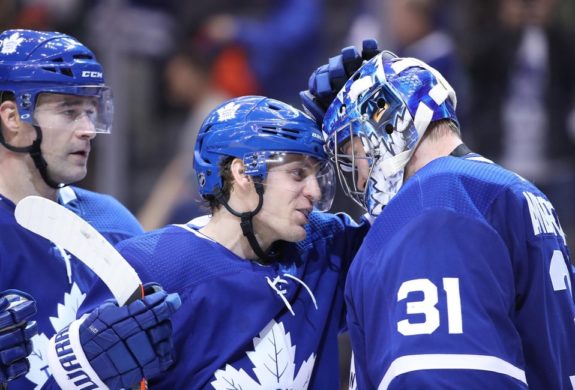
Destined for Stardom
While it seems like ages ago, Ennis isn’t that far removed from being a top prospect. The Edmonton native first drew attention in his rookie season with the Medicine Hat Tigers in 2005-06, 13 years ago. As a 16-year-old, he was selected to play at the World U-17 Tournament where led his squad with nine points in six games, propelling them to the bronze medal game, which they lost to the Czech Republic.

The following season, Ennis broke out with 26 goals and 50 points, adding another eight goals and 12 points in the playoffs on the way to winning the WHL’ top prize, the Ed Chynoweth Cup.
The 2007-08 season, Ennis’ draft year, saw him take another big step forward as he scored 43 goals, second among WHL players, and 91 points, the fourth highest total in the league. Despite only standing at 5-foot-9, his performance, as well a his speed and high hockey sense, made him one of the WHL’s top prospects in the 2008 NHL Entry Draft.
The Buffalo Sabres snapped up the talented sniper, using their second first-round selection on him, 26th overall. Ennis returned to play one more season in Medicine Hat, scoring another 43 goals and nearly broke the record for goals in a single game with six. It seemed there was little he could not do, and the Sabres were ecstatic to bring him into the organization.
NHL Success
Ennis quickly adjusted to the professional game, earning AHL Rookie of the Year honors in 2009-10 after scoring 65 points in 69 games. His speed and hockey sense were difficult to contain, even at the NHL level; a late-season call-up saw Ennis score eight points in nine games, then another four in six playoff games. He was the highlight of the Sabres’ short postseason run.
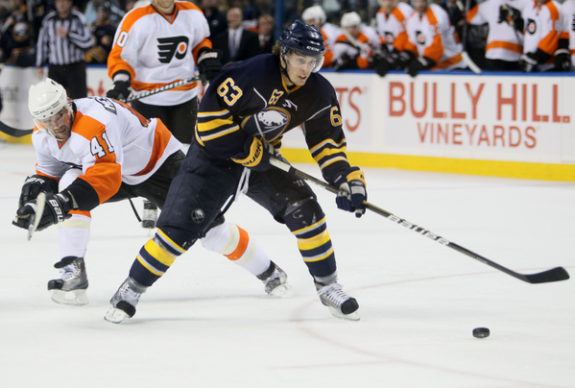
After the 2010 Playoffs, the Sabres were happy to give Ennis a permanent place in the lineup for the 2010-11 season, and he continued to show how valuable he was to the team. In his first full season, the quick sniper had 20 goals and 49 points, fourth among his rookie class, which was more than Taylor Hall, Derek Stepan and Brad Marchand.
Ennis was temporarily slowed down early in the 2011-12 season when he jammed his ankle into a goal post during a game against the Tampa Bay Lightning, keeping him off the ice until April. Still, he managed to score 34 points in 48 games. When hockey resumed for the 2012-13 season, he emerged as one of the top offensive threats, scoring 31 points in 47 games, third on the team. He followed it up with a 43-point season in 2014-15 and the promise that 2015-16 would be Ennis’ for the taking.
Injuries Take Their Toll
As history will tell us, Ennis never did emerge as a top scorer, largely due to a slough of injuries that derailed his career. First, he suffered a lower-body injury in October of 2015, causing him to miss two games, followed by an upper-body injury in November, keeping him out for 12. Then, a big hit from Alex Ovechkin in December left him with another UBI, this time landing him on the injured reserve (from ‘Ennis’ season continues to sink as Sabres forward is ‘week-to-week’ with injury’, BN Network – 1/2/16).
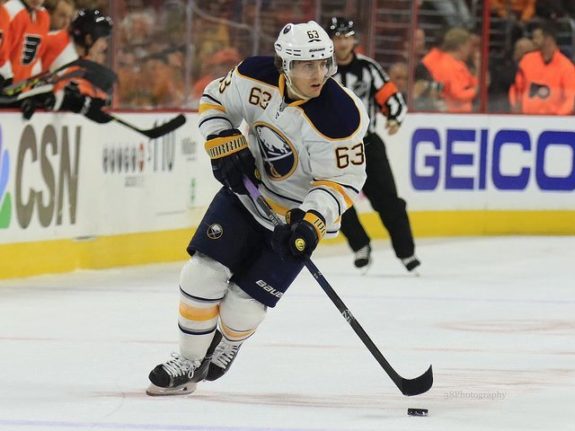
His injuries were kept under wraps until February, when it was revealed that Ennis had suffered a concussion and would be out indefinitely. He only played 23 games in 2015-16. Things didn’t improve in 2016-17, as he was again on IRL in November, recovering from groin surgery, which limited him to 51 games and only 13 points.
Despite signing a lucrative five-year, $23 million contract in 2014, the Sabres decided to give up on their once future star, sending him to the Minnesota Wild in 2017. Ennis was able to remain healthy in St. Paul, but his confidence took a beating and he was a healthy scratch several times throughout the season. After 73 games, he had 22 points and the Wild opted to buy out the final year of his deal.
The Toronto Maple Leafs signed him to a one-year, league-minimum deal to fill a depth role for the 2018-19 season. It seemed like a good fit: Ennis needed to regain confidence and the Maple Leafs had an excellent medical staff. Yet, after taking a shot off the ankle, Ennis was once again on the injured reserve, limiting him to 51 games and 18 points.
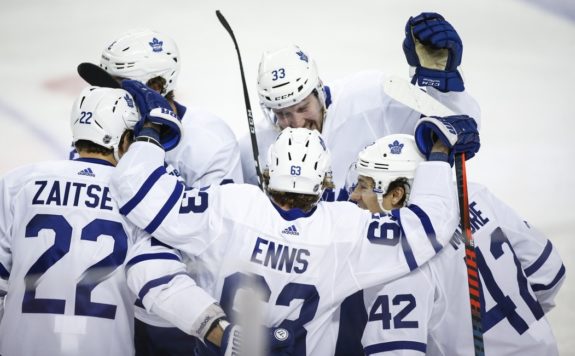
Future with the Senators
Ennis comes to Ottawa with much the same as last season, but there are a few special circumstances that could make his time with the Senators much more successful.
The first thing to note is that he is a natural winger, which he played in junior and during his most successful years in Buffalo, but he also plays center and has done so frequently in the NHL. That means he can fit into nearly any spot in the lineup, depending on where he is needed.
Very few roster spots are secure on the Senators. Only Brady Tkachuk and Colin White look to be guaranteed top-six roles. The rest of the team could end up virtually anywhere, depending on their training camp.
That gives Ennis the opportunity to fill in as needed. New coach D.J. Smith is familiar with him – and likewise Ennis with Smith’s system from playing in Toronto – and could rely on him to add stability early in the season while rookies like Drake Batherson get their feet under them. There’s also some familiarity with new development coach Clarke MacArthur, who played in Medicine Hat from 2002-05, leaving just before Ennis arrived. MacArthur could use him to help mentor young players.
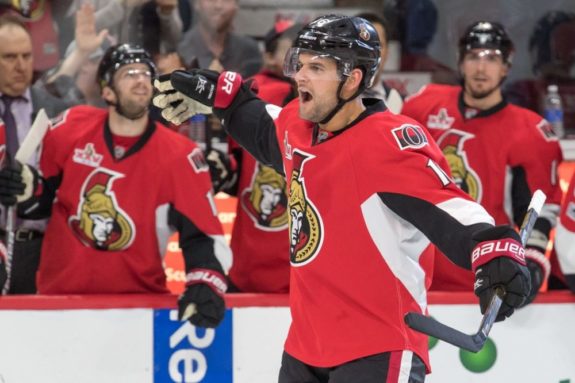
However, Ennis was signed to fill in the bottom-six, and he offers a skill that the Senators need desperately: a scoring depth center. As I mentioned in an earlier article discussing the selection of Shane Pinto, the Senators are lacking reliable center depth. In the future, Pinto is expected to fill that role, but for now, there are few better options than Ennis. He has the skills and intangibles and has proven he can score when healthy. That’s exactly what the Senators need after a painful 2018-19 season.
Related: Senators’ Strategic Selection of Shane Pinto
Finally, there’s the fact that Ennis is a small hockey player, just like Erik Brannstrom. Standing only 5-foot-10, Brannstrom has had to battle stereotypes from traditional hockey minds and learn how to survive in a league where most players are several inches taller. Over eleven seasons, Ennis has learned how best to approach the game when size is a disadvantage. While they play different positions, there’s a good chance that Ennis could become an unofficial mentor for the Senators’ future star, helping to become a smarter and more dangerous hockey player.
So far in his career, Ennis had defied expectations: an undrafted try-out who made the Tigers in 2005, a surprise first-round selection in 2008, and nearly a 50-point scorer in his first full NHL season, despite being well below what was considered NHL size. Injuries have wreaked havoc on his once-promising career, but he still has the drive and skill to succeed. He is, after all, only 29 years old.
Sure, Ennis wasn’t the big-name acquisition many have been hoping for, but he offers much more to the team than others could, while also coming in at a very affordable price tag. It sets up the Senators perfectly for the future, no matter how the season goes.